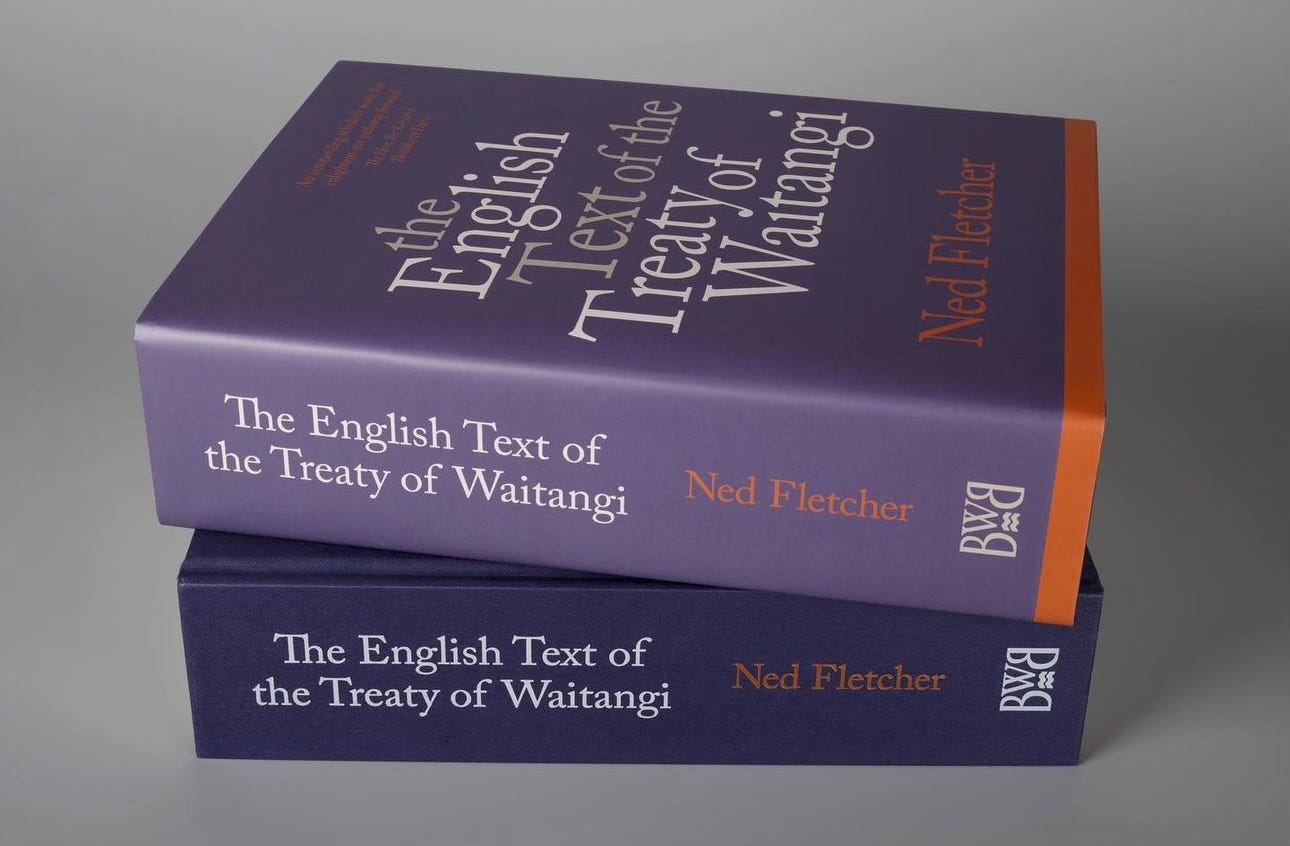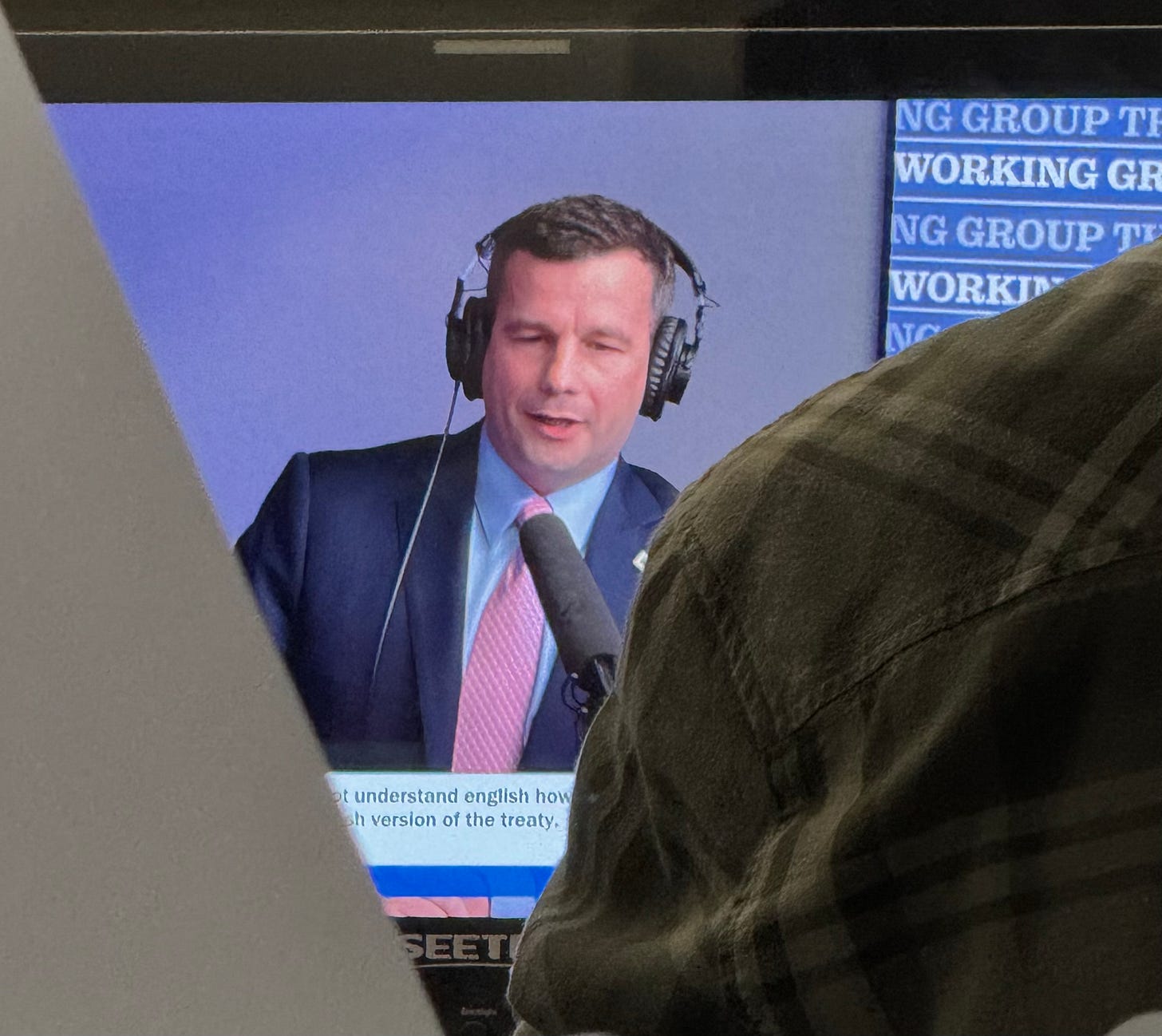NZ Treaty of Waitangi debate
Act leader David Seymour debates Iwi representative Helmut Modlik
Last night I was pleased to be invited to attend in person a televised debate on the Treaty of Waitangi (The Treaty), hosted by The Working Group (TWG) - NZ’s number one political podcast.
I had been invited partly as a previous guest on TWG, partly as a long time acquaintance of the host “Bomber” Bradbury, and partly as an independent journalist for Seeby’s Rumination’s (we’ve made the big time folks! I’m actually doing real reporting now).
I think that this debate was a fantastic initiative, as tensions on the disputed Treaty have been running fairly hot in New Zealand as of late, partly due to the introduction of Seymour’s “Treaty Principles Bill”, which seeks to establish a firmer agreement on what the Treaty actually means for all New Zealanders.
A large part of the confusion around the Treaty stems from the fact that it was written in two languages, so there are two separate versions of the Treaty, and the 500 or so Maori chiefs who signed the treaty mainly signed the Maori language version, and the British signed a different version in English. This then led to disagreements around what things like “Ceding sovereignty to the Queen” actually means in principle.
Starting in 1975, the NZ Government took a more liberal position on the Treaty and then ever since we have had a type of morphing and expanding co-governance which sometimes works, but often has blurry lines.
It’s difficult to have two captains of a ship so to speak, so while we need to respect the Treaty and honour it’s agreements, I think Maori and Pakeha also need to agree on something solid in order to move forward - which if you ask Seymour is exactly what he’s trying to achieve!
Anyway, It was good two intelligent representatives from either side of the “number 8 fence” share their views in a civil manner, rather than the sometimes tense confrontations that have occurred on annual Waitangi day celebrations.
If you’re a New Zealander, I think we could all benefit from understanding each other’s point of view, and so I encourage you to watch the debate on YouTube below.
However, I’m also going to summarise my personal observations from the debate if you keep reading, so you don’t need to watch the video if you just want to get my opinion.
The Arrival
The debate was held at Mediaworks impressive head office in College Hill, Auckland. I arrived first, greeted by TWG hosts Bomber Bradbury and Damien Grant, and soaked up the grand spaces, while waiting for other people to arrive
Next to arrive was Helmut Modlik, speaking for the Iwi side of the argument, wearing a large white bone carving around his neck, and with an entourage of half a dozen people.
Helmut certainly had some “Mana” in his stride, and I liked the way that he asked about my unusual name and where I was from, in the delightful way that Maori people do - names, places, and ancestors being more important to them over perhaps the jobs and titles that westerners ask about. He made me feel special.
Helmut’s wife was carrying a copy of “The English Text of the Treaty of Waitangi by Ned Fletcher”, an intimidating 1,000 page book that would certainly cripple someone if dropped on a foot. I could peek at notes hiding in the pages and the effect was intimidating “These people have come prepared”. I have absolutely no idea how the 9-page English version of the Treaty can have been expanded into a 1,000 page book, but clearly there must be some things I don’t know in there. Or perhaps this is just what academics in universities do - expand simple things into giant books that other experts in the field are then forced to read if they want to claim to be informed.
David Seymour arrived last, but perfectly on time, 10 minutes before the show started, accompanied only by his wife. Unfazed and smiling, he still looked out numbered.
Despite the fact that everyone was there for a sparring match, everything was civil and there were handshakes and hongis all round - something that is great about New Zealand - adversaries can get along.
All in all we were a group of about 20 people: The debaters and supporters, a film crew from Maori TV, a couple of random reporters (including me I suppose), and the hosts.
David Seymour’s Position
Semour, to me, seemed to be making some very logical points, I think his 3-minute opening monologue was a thing of beauty
Different rules for different races has never worked anywhere it’s been tried, it just ends up in apartheid and fighting.
One rule of law needs to apply to all New Zealanders so we all have the same opportunities to thrive and the rules are clear.
People need to be treated equally, separating people by ancestry is racism. You can’t solve racism by introducing different polices based on race.
His Treaty Principles Bill still allows for things like Treaty Settlements, it just clarifies governance and removes confusing “co-governance” scenarios.
This all seemed to make sense to me, and clearly Seymour is one of the sharpest, if not the sharpest speakers in NZ Politics at the moment. Love him or hate him, he’s eloquent and smart if you actually take the time to listen to him properly.
Helmut Modlik’s Position
Helmut took the position that :
Maori never ceded sovereignty because they never understood that to be the case in their version of the treaty.
It is preposterous to assume that 500 proud warrior chiefs would ceede sovereignty of their lands to a queen on the other side of the world, when she only had a few white people in NZ at the time.
If Maori never ceeded sovereignty, then there is no basis that Maori can be governed by the crown, and therefore we must find a way to co-govern.
While I understood the position that Helmut took, it seemed to me that there were no real solutions presented for how Maori suggest we make co-governance work elegantly, just from the Maori perspective, that’s what they want.
500 Chiefs signed The Treaty - Why?
Clearly I’m not an academic or Treaty expert, and I haven’t read the 1,000 page book on The Treaty mentioned above. I have however in my times read some NZ history, and I thought I had a pretty good understanding of why Maori *might* have ceded sovereignty when signing The Treaty (something that is now often disputed by some but not all Maori as per Modlik’s arguments).
Before the Signing of the Treaty in 1840, Maori had been trading with Europeans for 50+ years, and understood things like the power of the British Empire.
While trading with Europeans, one of the things that were traded were Muskets, and this resulted in the Maori Musket wars of 1820, this meant that the death rate of inter-Maori wars was becoming a massacre compared to pre-musket wars, becoming British citizens would enable the Maori Musket wars to end.
Due to the introduction of new Diseases from overseas, by 1840 30% of Maori had died, and there were fears that Maori might die out if the Maori wars didn’t stop.
In the 1800’s New Zealand was not really owned by anyone and had become a lawless and unsafe place for both Maori and European settlers, becoming British citizens would mean that we got a police force, laws, and therefore law and order.
The French were eyeing up New Zealand as a potential colony, and there were fears that if the people of New Zealand didn’t become British citizens, then we would be forced to become French citizens, and that would be worse.
Sir Apirana Ngata wrote that Maori understood that they ceeded sovereignty in his books in return for becoming British Citizens, and gave many of the reasons above.
These matters are all covered in the following You Tube video, and explained better than I could explain them. If we are to try and reverse engineer what the Maori who signed the Treaty may or may not have been thinking when they signed it and what their intentions were, then we need to not just try to read, translate and analyse the Maori version of The Treaty, but ALSO analyse the history and the historical context in which the Treaty was signed.
Post Debate Discussion
After the debate, I got to talking to one of the “Iwi side” entourage, and unfortunately we reached an impasse in our opinions almost immediately.
The example that this person gave was was that Maori generally have poorer health than Pakeha. Therefore, they believed that until Maori health is just as good as Pakeha health, the Treaty is not being honoured, and solutions such as a separate Maori health authority, and additional funding is not only justified, but an absolute need.
My view - perhaps influenced by Seymour - is that if agree via the Treaty Principle Bill that all NZers are to treated equally, and we all have exactly the same access to hospitals, GPs etc, then why should skin colour matter? My view is that this a poverty issue, not a skin colour issue, and that poor health outcomes are probably just as likely for poor white people as they are poor Maori - in which case we should be providing additional assistance to ALL poor people with poor health outcomes, not just Maori with poor health outcomes.
Even more troubling for me was was the fact that the discussion led to talking about how to deal with “edge cases” (My Ex wife - who is Scottish and has blonde hair and blue eyes, but was in fact 1/32nd Maori), doesn’t need any additional healthcare assistance from a separate Maori authority but would receive it. The Iwi side of the argument was resolute - if you’re 128th Maori, you’re Maori, and if you’re 0% Maori you’re not Maori.
I’m just not sure how it’s going to work long term dividing up the country into Maori and Not Maori with different governance rules for each and special benefits for some and not others.
As Seymour said, separating people via skin colour has always become problematic every time it’s been tried
As always, this whole Treaty thing is messy. We all need to try to work together to find a solution, and the start can be having the debates like the one that I just witnessed.
Kia Kaha Aotearoa.







